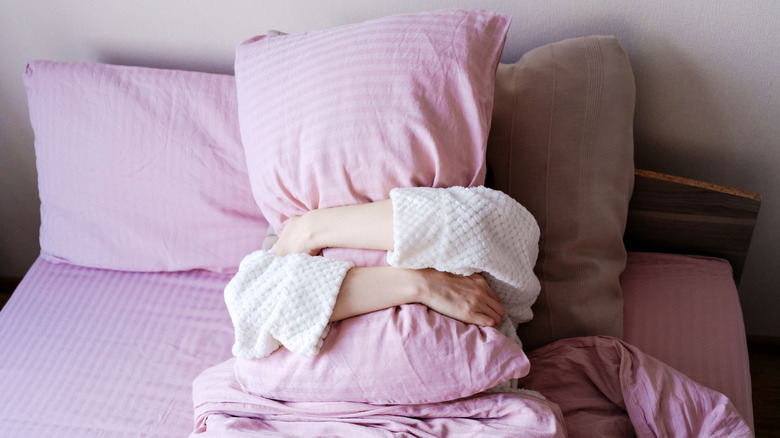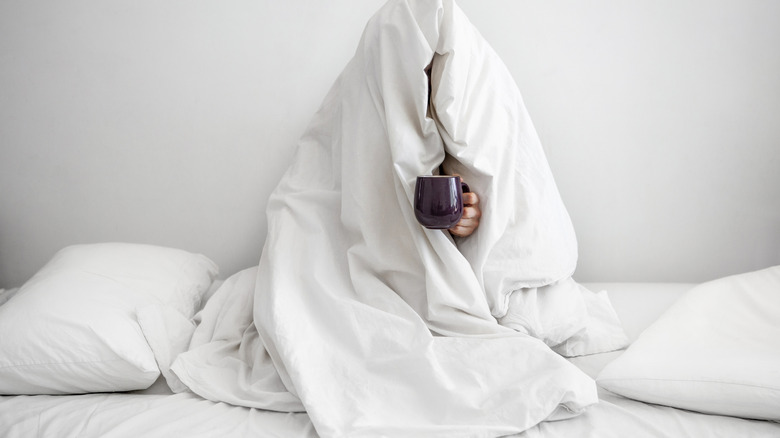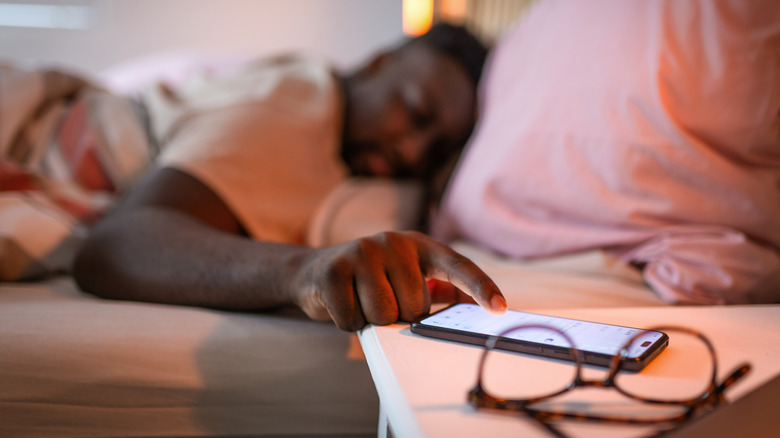Leaving Your Bed Unmade In The Morning Can Say A Lot About Your Personality
If you grew up with the strict rule of making your bed every morning, you're certainly not alone. While making your bed every morning has been a common task taught to us by our caregivers, some adults just don't do it. There's no single reason behind leaving your bed unmade, with reasons ranging from poor sleep, chronically running late in the morning, or forgetfulness. That said, if you're one of the many people who don't typically leave your bed a bit of a mess, experts have actually uncovered a range of possible benefits of not making your bed.
Nevertheless, experts on the other side of the aisle have long argued that the benefits of making your bed outweigh any of those associated with leaving it unmade. Among those benefits might even be the possibility of better mental health. Regardless of your opinion on the matter, not engaging in this social norm could also say a few key things about your personality. This can range from sleep chronotype and creativity traits, to issues with sleep procrastination and more. Just keep in mind that leaving your bed unmade in the morning might possibly point to certain personality traits, but these aren't set in stone. Also, any issues with sleep and your health ought to be addressed with a health care professional.
You may not be a morning person
When it comes to sleep habits, people are often categorized into two camps: morning people or evening people. A third, more recently recognized category is an afternoon person, which falls in between the personality traits of either a morning or evening person. From the perspective of psychology and sleep sciences, these terms are primarily used to describe your personality and how it influences your alertness at certain points of the day. If you're a morning person, you're likely to have a lot of energy earlier in the day and want to go to sleep earlier than a "night owl." Indeed, some people can jump out of bed at an early hour and are naturally eager to start their day, which can include making their beds. Researchers even believe that some people are just naturally inclined towards alertness earlier in the day thanks to their genetic makeup.
For others though, getting out of bed can be a struggle, especially before that first cup of coffee or tea. If you fall into the latter camp, you might be unlikely to make your bed when you get up in the morning. In fact, you might go through multiple rounds of alarm clocks and then finally make it out of bed just in time to get ready to go to work.
Not being a morning person is arguably the most common personality trait associated with not making your bed upon waking up. So if you're wanting to start a habit of making your bed, then you might want to consider possible ways to become a morning person again.
You might not care about social rules and norms
Sometimes not making the bed goes beyond whether or not you might be classified as a morning person. Even if you do consider yourself more of a morning person, this doesn't mean you automatically make your bed. In fact, it's possible that you are very much alert during the early hours but choose to move on and do that don't involve making the bed. If you are not among the estimated 70% of people who make their beds every morning, you might have what is described as a non-conformist personality.
Of course, what is considered "normal" is highly subjective, but there are a few traits and behaviors that society might label as normal. Sometimes making a bed is one of them, especially considering that most people do so. If you're more of a non-conformist, you might be someone who doesn't care about these sorts of smaller social norms, and they might even seem meaningless to you. The American Psychological Association takes their definition of a non-conformist a step further by stating that such a personality trait can indicate independence, or perhaps sheer ignorance of social norms. For example, there may have been expectations that you made your bed in the morning when you were growing up, but now you just don't want to and choose not to follow that rule. Additionally, being a non-conformist means you might be more likely to take risks in various parts of your life, such as in your career. This doesn't mean everyone who leaves their bed unmade is automatically a risk-taker or a non-conformist, but it's interesting to think about how these personality traits might be related.
You might not be routine oriented
Leaving your bed unmade in the morning could also mean you don't have a set daily routine. This is especially the case if you used to make your bed every day, but have not managed to stick with it consistently in recent months or years. There's also a chance that you have never really been routine oriented to begin with. In such instances, you might make the bed every once in a while, but you're not likely to prioritize this task on a daily basis.
There are a number of reasons why you might not have a set routine that would lead to making your bed every day. For one, if your job has varying hours, you may sometimes forget to make your bed when you work extremely early shifts. It can also be challenging to make the bed every day if you have a partner who sleeps in later than you do. (On that note, some people might consider sleep divorces to improve their health.) Alternatively, if you just abhor routine and don't really adhere to any daily rituals, chances are greater that you might nix the idea of making the bed altogether.
You may have a creative personality
Aside from people who do not prefer a lot of rigid rules or norms, there are other personality types that may also be less likely to make their beds. While a strict bed-maker might erroneously regard your anti-bedmaking as being scattered and lazy, the truth might be that you have a creative personality and don't really regard making the bed as a personal priority. If you happen to be a writer or an artist who regularly leaves your bed unmade, this possible link might certainly speak to you. After all, there's so much to create in the world, but making your bed to perfection might not be the one you're most invested in.
Of course, this doesn't mean that all creatives refuse to make their beds, but the possible connections between creativity and levels of tidiness has garnered some interest in recent years. In fact, there's some research that even suggests that keeping extremely tidy personal spaces could adversely affect creativity. While more research is needed on the direct connection between creative personalities and a lack of bed making, it may be fun to consider whether you or other creatives in your life might be less likely to make their beds.
You might struggle with sleep procrastination
If you tend to procrastinate, you might put off everyday tasks because you just don't feel like doing them. Leaving the bed unmade could theoretically be one of these tasks, but some people who are prone to procrastination might still get to it anyway (eventually, at least). If you are a chronic procrastinator who also tends to have perfectionist tendencies, you might skip out on tasks like making the bed unless you know you can complete them to your own high standards.
The case might be different if you have sleep procrastination, though. This type of procrastination involves intentionally doing other non-essential activities instead of sleeping. For example, you might engage in unnecessary things such as binge-watching a show or scrolling through your smartphone while in bed. You might do such things on a regular basis even if you know you really should be sleeping. Experts also refer to this kind of behavior as "revenge bedtime procrastination," and it's a sleep disorder you might have right now without even knowing it. In turn, this tendency might mean you constantly sleep in late due to overall lack of shut-eye and have to skip out on making your bed.
You may lack motivation
In some cases, leaving the bed unmade can point to things aside from procrastination, such as short-term or long-term motivation issues. Though procrastination and lack of motivation can go hand in hand, one doesn't necessarily indicate the other. On the point of motivation, the key here is to ask yourself whether you used to regularly make your bed daily at some point in the past. If this is the case and you're now leaving your bed unmade on a regular basis, motivation problems could be at hand.
There are of course a variety of reasons why you might not be motivated. Perhaps you're experiencing a difficult time at work or in your relationships, or maybe you have significant burnout and fatigue. In other cases, a consistent lack of motivation may be associated with an underlying medical or mental health condition that should be evaluated by a healthcare provider. That said, it's also worth noting that if you truly are unmotivated, leaving the bed unmade is likely not the only daily task you're not completing at the moment.
You might be more prone to stress and anxiety
Stress and anxiety are two common struggles, but their effects and presentation are often wide ranging. These two entities can also fuel problems with procrastination and motivation, so it's possible that a combination of these traits might be affecting your daily routine (or lack thereof). While there's currently no clinical evidence directly linking bed-making with better mental health, research does point to the fact that home clutter can have negative effects on your mental health more generally. To that end, leaving your bed unmade might be one of many signs that you're a bit stress prone — or at least dealing with more stress at the time — though the exact link needs more scientific proof.
While leaving your bed unmade doesn't automatically mean you struggle with stress and anxiety, some experts suggest that people who make their beds do tend to be more relaxed overall. Similarly, other potential benefits of making your bed include feelings of calm and focus. This seemingly simple act can also help you feel like you accomplished something, which can possibly boost your mood and combat stress. What's more, making your bed might even help you sleep better, and may just be one of the things you can do to reduce anxiety.







